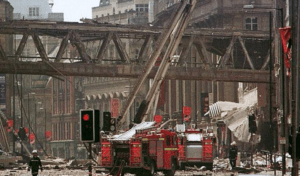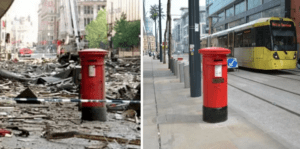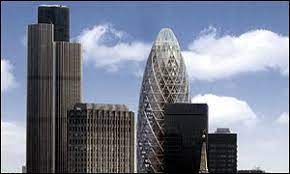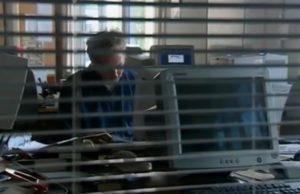- Programme not well produced… - 2nd January 2026
- Multi million pound Match of the Day! - 1st January 2026
- Wordy again part two - 31st December 2025

Reporting unexpected positive news from terrible events has always been important to our Editor, Welshman Phil Parry, and now comes new research showing that some businesses may be sheltered and can grow after bombing campaigns, with economic prosperity prompted.
Earlier Phil has described how he was helped to break into the South Wales Echo office car when he was a cub reporter, recalled his early career as a journalist, the importance of experience in the job, and making clear that the‘calls’ to emergency services as well as court cases are central to any media operation.
 He has also explored how poorly paid most journalism is when trainee reporters had to live in squalid flats, the vital role of expenses, and about one of his most important stories on the now-scrapped 53 year-old BBC Wales TV Current Affairs series, Week In Week Out (WIWO), which won an award even after it was axed, long after his career really took off.
He has also explored how poorly paid most journalism is when trainee reporters had to live in squalid flats, the vital role of expenses, and about one of his most important stories on the now-scrapped 53 year-old BBC Wales TV Current Affairs series, Week In Week Out (WIWO), which won an award even after it was axed, long after his career really took off.
Phil has explained too how crucial it is actually to speak to people, the virtue of speed as well as accuracy, why knowledge of history and teaching the subject is vital, how certain material was removed from TV Current Affairs programmes when secret cameras had to be used, and some of those he has interviewed.
He has disclosed as well why investigative journalism is needed now more than ever although others have different opinions, how the coronavirus (Covid-19) lockdown played havoc with media schedules, and the importance of the hugely lower average age of some political leaders compared with when he started reporting.

The immediate effects are shocking, but the long term ones can be benign.
For example 220 people were injured, but many more left traumatised when in 1996 two IRA members planted the UK mainland’s biggest bomb since World War Two (WW2) outside a Manchester shopping centre which ripped the heart out of the city centre.

It caused £700 million worth of damage.
This was an appalling event, and it is a miracle that no one was killed, but the blast kick-started the city’s regeneration.
After the bomb, Manchester received about £583 million in private and public funding towards its renewal, which saw it attract upmarket retailers such as Selfridges and Harvey Nichols.


So it was with the after-effects of London’s Blitz during WW2, and new research seems to confirm this.
Between September 1940 and May 1941 about 30,000 German bombs fell on the city – 577,000 homes were destroyed, and 43,000 people were killed.

This was a terrible tragedy, however work by Gerard Dericks of Oxford Brookes University and Hans Koster of Vrije Universiteit Amsterdam showed something rather different.
After much of the city was razed, London built back bigger, and that supercharged the city’s economy in the long run.
For instance, before the war getting permission to build was costly and slow, but redevelopment AFTER the Blitz was often subject to less stringent rules.
With many historic sites destroyed, there was less to preserve, and buildings constructed on bomb sites were taller than their predecessors.

More modern techniques and designs were used, so the buildings could reach into the skies.
The heavily-bombed central and eastern areas of London are now home to some of the tallest and most eye-catching buildings in Europe, such as the ‘Gherkin’, otherwise known as 30 St Mary Axe.
In fact it’s reckoned that London’s Gross Domestic Product (GDP) would be 10 per cent lower if the Blitz hadn’t happened – equivalent to a loss of £64 billion.


There are examples, too, closer to home.
A total of 230 people were killed and 397 were injured in the notorious Swansea Blitz, when 41 acres of land were flattened by the Luftwaffe in February 1941.
The whole centre was wiped out, with department stores including Ben Evans – known as the Harrods of Wales – disappearing overnight.

The city had been selected by the Germans as a legitimate strategic target due to its importance as a port and docks, with the oil refinery just beyond.
This, again, was a dreadful event, but it could be argued that it laid the groundwork for Swansea’s rejuvenation many years later.
After a first botched attempt at rebuilding the city in the 1950s, there are now plans for a £750 million transformation of the centre.

Nobody should underestimate the awful tragedies of some events (in this case bombings), but every cloud as they say…
The memories of Phil’s astonishing decades-long award-winning career in journalism (during which he often reported on ‘positive’ aspects of appalling tragedies) as he was gripped by the rare disabling condition Hereditary Spastic Paraplegia (HSP), have been released in a major book ‘A GOOD STORY’. Order it now!

Regrettably publication of another book, however, was blocked because it was to have included names.
Tomorrow, Phil looks at how fierce rivals can come to an agreement.










